| Srl | Item |
| 1 |
ID:
160648
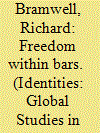

|
|
|
|
|
| Summary/Abstract |
This paper examines the construction of prisoners’ identity through rap in England’s high security prisons. While hip hop studies has often addressed rap’s connection to the social practices of criminalized youths, prison rap cultures have received scant attention. This paper draws on a series of rap workshops and interviews with prisoners to investigate the experiences of black prisoners in high security prisons and how identities are produced and negotiated through rap. Rap is associated with the production of a range of identities and identifications, enabling prisoners to accommodate themselves to the conditions of their incarceration and to challenge aspects of the criminal justice system that they experience as unfair or illegitimate.
|
|
|
|
|
|
|
|
|
|
|
|
|
|
|
|
| 2 |
ID:
185181


|
|
|
|
|
| Summary/Abstract |
In the context of the fight against Islamist radicalization in France, prison intelligence rapidly developed from 2015 through the gradual creation of a dedicated service and a specific corps of professionals. This professionalization of prison intelligence work has deeply transformed the prison administration. This article aims to describe and analyse these transformations on the basis of an ethnographic study conducted in radicalization assessment units, which are specific units set up to assess prisoners who have committed or are suspected of committing crimes linked to radical Islam. We shall describe how the guards, probation officers, psychologists and educators participating in assessing the prisoners adapt to the new, encroaching presence of the intelligence mission. We shall analyse the forms of collaboration and competition between this staff and the prison intelligence officers. Lastly, we will examine criticism of the intelligence activity in the radicalization assessment units voiced by various professionals. The interpenetration of the assessment work and the intelligence mission – which are formally distinct missions – produces a specific type of knowledge relating to radicalized prisoners: a reproduction of certain representations or ‘profiles’.
|
|
|
|
|
|
|
|
|
|
|
|
|
|
|
|
| 3 |
ID:
155538


|
|
|
|
|
| Summary/Abstract |
About 3 million people around the world who are currently behind bars have not been convicted of a crime. World Policy Journal investigates the uses and abuses of pretrial detention.
|
|
|
|
|
|
|
|
|
|
|
|
|
|
|
|
| 4 |
ID:
119871
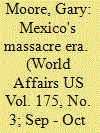

|
|
|
| 5 |
ID:
159798


|
|
|
|
|
| Summary/Abstract |
Studies undertaken on female homicide offenders are limited in both number and breadth, particularly within South East Asia. This article has consequently chosen to explore Cambodian women’s narratives of their journeys to prison for homicide offending using a feminist pathway approach. Results show a number of common threads in the women’s stories: childhood instability, economic marginalisation, criminalisation occurring within the milieu of a relationship with a man and limited access to justice and/or ability to benefit from corrupted criminal justice practices. Additionally, six distinct pathways were identified from the narratives: 1) domestic violence pathway, 2) pathway of marital abandonment, 3) traumatic life history pathway, 4) deviant women pathway, 5) pathway of male association, 6) pathway of feminine familial sacrifice.
|
|
|
|
|
|
|
|
|
|
|
|
|
|
|
|
| 6 |
ID:
155528
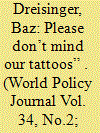

|
|
|
|
|
| Summary/Abstract |
Singapore has transformed its prison system over the last 20 years to focus on rehabilitation, and recidivism rates have fallen by nearly 50 percent. But Baz Dreisinger finds that the government’s push to employ former prisoners is driven more by an abundance of low-level jobs than any moral calculus.
|
|
|
|
|
|
|
|
|
|
|
|
|
|
|
|
| 7 |
ID:
193121


|
|
|
|
|
| Summary/Abstract |
How does political imprisonment influence anti-regime protest? We argue that political imprisonment facilitates rather than stifles protest. Political imprisonment is a salient indicator of arbitrary rule creating ‘embodied grievances’. It enables the formation of dissident networks within prisons, and serves as a legitimating credential for former inmates to lead resistance. These mechanisms imply that political imprisonment is a self-defeating strategy, making it easier for the opposition to overcome their collective action problem. We test our argument with subnational data from the German Democratic Republic between 1984 and 1989. To account for endogenous latent dissent, we use originally collected archival data on local surveillance operations. Exploiting daily variation in the timing of protests in 1989, we analyze the long-term impact of political imprisonment on mobilization. Results from survival analyses lend support to our hypothesized relationship. Combined with semi-structured interviews to probe our mechanisms, our findings suggest that political imprisonment increases the likelihood of protest mobilization.
|
|
|
|
|
|
|
|
|
|
|
|
|
|
|
|
| 8 |
ID:
121431
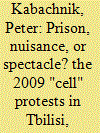

|
|
|
|
|
| Publication |
2013.
|
| Summary/Abstract |
For over three months in 2009 demonstrations took place in front of the Georgian Parliament on Rustaveli Avenue in Tbilisi, the capital of the Republic of Georgia. The protest involved a unique production of urban space as makeshift prison "cells" were placed in the landscape. The cells emerged following calls by the host of a popular reality television show, Cell #5. In order to illustrate the multiple meanings that people have of terrains of resistance, I highlight three dominant associations that people attributed to the cells: the prison metaphor; a public nuisance; and a spectacle. This case clearly exemplifies how popular culture will not only impact people's geopolitical understandings of the world but can directly alter the landscape and transform and encourage oppositional politics in a direct and immediate manner.
|
|
|
|
|
|
|
|
|
|
|
|
|
|
|
|
| 9 |
ID:
076045


|
|
|
|
|
| Publication |
2006.
|
| Summary/Abstract |
This selection, the concluding part of a five-part memoir of his experiences as a Red Army soldier during World War II, contains Aleksei Maslov's recollections of his experiences after being liberated by Allied forces from a German prisoner-of-war camps. After falling captive in July 1942 during the Wehrmacht's advance to Stalingrad, Maslov suffered through two years of imprisonment in POW camps in German-occupied territories and Germany itself before being assigned work as a slave laborer in the German war economy. Once liberated, Maslov spent time in British internment camps in northern Germany and England before being returned to his Homeland. His candid description of his treatment upon his return to the Soviet Union, in particular, his interrogations by Soviet counterintelligence organs, demonstrated how a vindictive Stalin nation welcomed home those few of his Red Army's few heroes who survived German captivity.
|
|
|
|
|
|
|
|
|
|
|
|
|
|
|
|
| 10 |
ID:
172254


|
|
|
|
|
| Summary/Abstract |
Putting the cultural experiences of a multitude of prisoners during the Cultural Revolution in the historical context of the modern Chinese prison system and in light of the critical theories of methods of penalty and cultural production under incarceration in modern society, this article argues that the formal prison and informal cowshed during the Cultural Revolution both served as important sites for cultural production and dissemination. They also demonstrated the inmates’ perseverance, articulation and resistance. Beneath the surface of highly structured and formulaic daily routine, mechanic ritual performance and forced obeisance, the political prisoners utilized multiple available forms to negotiate with the authorities, influence each other and even their guards, and maximize the freedom of reading, communication and gaining outside information.
|
|
|
|
|
|
|
|
|
|
|
|
|
|
|
|
| 11 |
ID:
040447


|
|
|
|
|
| Publication |
London, Neville Spearman Limited, 1965.
|
| Description |
218p.: ill.Hbk
|
|
|
|
|
|
|
|
|
|
|
|
Copies: C:1/I:0,R:0,Q:0
Circulation
| Accession# | Call# | Current Location | Status | Policy | Location |
| 000728 | 920.932712/LON 000728 | Main | On Shelf | General | |
|
|
|
|
| 12 |
ID:
155529
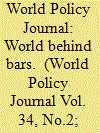

|
|
|
|
|
| Summary/Abstract |
World Policy Journal visits prison cells in the U.S., Nicaragua, Norway, and Japan.
|
|
|
|
|
|
|
|
|
|
|
|
|
|
|
|